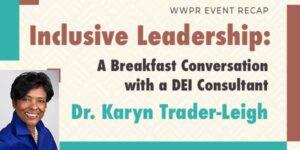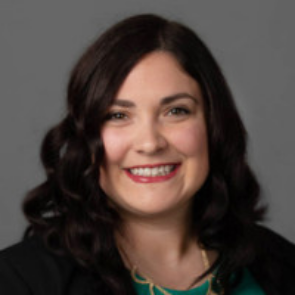Inclusive Leadership: A Breakfast Conversation with a DEI Consultant
Apr 6, 2021 | Events, News & Updates
 On Thursday, March 25, WWPR held a virtual breakfast discussion for senior-level communicators. The topic? Being an inclusive leader. During the event, communicators at the height of their careers asked their most pressing questions about Diversity, Equity, and Inclusion (DEI) to Dr. Karyn Trader-Leigh, founder of KTA Global Partners and a People and Culture consultant with over 30 years of experience. The senior communicators in attendance also shared their own personal experiences and their company’s DEI journey. All attendees came away with actionable insights they can apply to their workplaces and every day lives. 2010 WWPR Woman of the Year Debra Silimeo, president of The Silimeo Group, facilitated the conversation with the following questions for Dr. Trader-Leigh: What does it mean to be a culturally competent leader? Dr. Trader-Leigh’s advice was based around one simple premise: be accessible in terms of how you show up. Your behavior communicates whether you are accessible or not. For example, do you stop and talk to your employees? Either action is a clear signal to your team and staff. The second is being seen engaging with people of color and people with diverse backgrounds. In this case, actions again speak louder than words. And we’re not just talking at work--it needs to be reflected in your personal life too. How do you learn the skills necessary to be an inclusive leader? "Inclusion happens by design, not by default." According to Dr. Trader-Leigh, inclusivity is a trait that should be expected from our leaders in every workplace but takes time to cultivate. If you're going to be a leader, you need to be open to being coached. Dr. Trader-Leigh explains that, while you may behave one way, your DEI efforts might not appear in the way you intended. Senior leaders need to go out of their way to find out how people lower in the organization are really feeling, such as with a staff survey or by opening space for them to address their concerns. Or even better, offer to be a mentor to younger staff members. Is being anti-racist part of being a culturally inclusive leader? Dr. Trader-Leigh remembers a time when we couldn't even say the word “racist.” As a society she’s glad we're talking about it, but cautions that this type of language can still be alienating. In her mind, practices of anti-racism ought to be clear in policies and practices. Especially ensuring the outcomes and impacts of your organization’s activities aren’t racialized or inequitable, even if unintentional. Are diversity initiatives actually leading to long-term change? Whether the diversity initiatives at your organization ultimately succeed is up to you, Dr. Trader-Leigh emphasized. Senior communicators may be in a business of serving people, but whether you are perceived as culturally competent is a different story. It’s about how you show up and how you manage your emotions. [caption id="attachment_7114" align="alignright" width="150"]
On Thursday, March 25, WWPR held a virtual breakfast discussion for senior-level communicators. The topic? Being an inclusive leader. During the event, communicators at the height of their careers asked their most pressing questions about Diversity, Equity, and Inclusion (DEI) to Dr. Karyn Trader-Leigh, founder of KTA Global Partners and a People and Culture consultant with over 30 years of experience. The senior communicators in attendance also shared their own personal experiences and their company’s DEI journey. All attendees came away with actionable insights they can apply to their workplaces and every day lives. 2010 WWPR Woman of the Year Debra Silimeo, president of The Silimeo Group, facilitated the conversation with the following questions for Dr. Trader-Leigh: What does it mean to be a culturally competent leader? Dr. Trader-Leigh’s advice was based around one simple premise: be accessible in terms of how you show up. Your behavior communicates whether you are accessible or not. For example, do you stop and talk to your employees? Either action is a clear signal to your team and staff. The second is being seen engaging with people of color and people with diverse backgrounds. In this case, actions again speak louder than words. And we’re not just talking at work--it needs to be reflected in your personal life too. How do you learn the skills necessary to be an inclusive leader? "Inclusion happens by design, not by default." According to Dr. Trader-Leigh, inclusivity is a trait that should be expected from our leaders in every workplace but takes time to cultivate. If you're going to be a leader, you need to be open to being coached. Dr. Trader-Leigh explains that, while you may behave one way, your DEI efforts might not appear in the way you intended. Senior leaders need to go out of their way to find out how people lower in the organization are really feeling, such as with a staff survey or by opening space for them to address their concerns. Or even better, offer to be a mentor to younger staff members. Is being anti-racist part of being a culturally inclusive leader? Dr. Trader-Leigh remembers a time when we couldn't even say the word “racist.” As a society she’s glad we're talking about it, but cautions that this type of language can still be alienating. In her mind, practices of anti-racism ought to be clear in policies and practices. Especially ensuring the outcomes and impacts of your organization’s activities aren’t racialized or inequitable, even if unintentional. Are diversity initiatives actually leading to long-term change? Whether the diversity initiatives at your organization ultimately succeed is up to you, Dr. Trader-Leigh emphasized. Senior communicators may be in a business of serving people, but whether you are perceived as culturally competent is a different story. It’s about how you show up and how you manage your emotions. [caption id="attachment_7114" align="alignright" width="150"] Written by Melinda Tolliver, WWPR Content Marketing Co-Chair, Senior Manager, Digital Strategy, National Alliance for Public Charter Schools.[/caption] Dr. Trader-Leigh ended her talk with these three pieces of advice:
Written by Melinda Tolliver, WWPR Content Marketing Co-Chair, Senior Manager, Digital Strategy, National Alliance for Public Charter Schools.[/caption] Dr. Trader-Leigh ended her talk with these three pieces of advice:- Remember, the organization is better if the leader is better.
- Leadership development is key.
- Senior leaders need to reach out and make sure they help mid-level and junior employees.